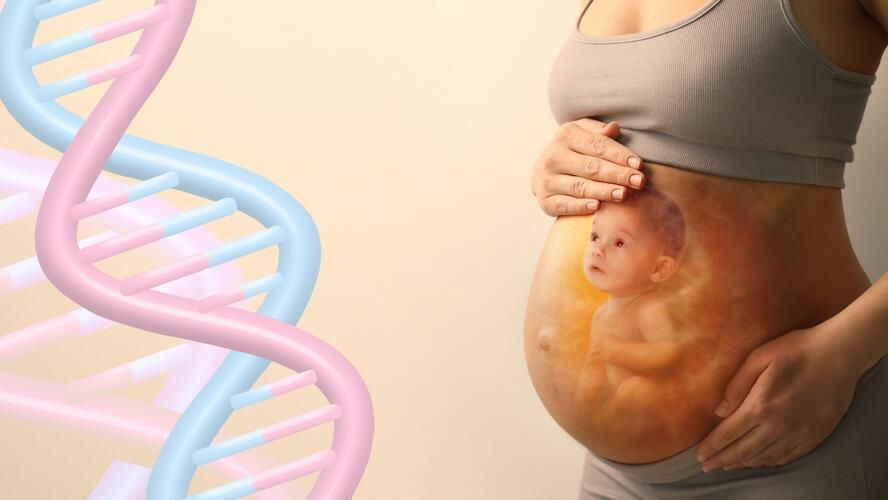Getting your Trinity Audio player ready...
A new study by Israeli health maintenance organization (HMO) Maccabi Healthcare Services reveals that a new genetic test may detect severe genetic defects in fetuses that would have otherwise been considered healthy in the currently recommended routine pregnancy tests.
Currently, this test, which costs thousands of shekels, is only available privately, raising the question of when, or if, it will be included in the Medical Services Basket as part of the country's universal healthcare.
Meanwhile, expecting mothers are offered a karyotype test, also known as amniocentesis or chorionic villus sampling, which can identify significant changes in the number or structure of chromosomes in the fetus. The test is covered as part of the Medical Services Basket from age 32, and at a younger age, based on specific medical indications.
However, this test can’t detect small chromosomal deletions or duplications, which aren’t visible under a microscope and are referred to as "submicroscopic changes" that can cause various genetic defects.
For this purpose, the genetic chip test has been introduced in recent years, performed on genetic material taken during amniocentesis or chorionic villus sampling. It's able to detect minute changes across all chromosomes, significantly increasing the number of disorders that can be diagnosed during pregnancy.
According to Maccabi's study, an even more advanced genetic test, called exome sequencing, may significantly increase the number of fetuses diagnosed at risk or suffering from severe diseases. In the test, also performed on the fetus's genetic material collected from amniocentesis or chorionic villus sampling, the fetus's genetic segments are compared to normal genetic material, allowing the detection of specific genetic changes in the fetus.
"Exome sequencing identifies specific genetic changes that the chip can’t detect due to its lacking resolution," says Dr. Michal Levy, who headed the study. "A fetus with specific changes may appear completely normal in the chip test. According to the findings revealed in the test, such a result could indicate that the child will suffer or is at certain risk for a condition.
“The severity of the risk depends on the type of findings identified. The challenge with this test sometimes lies in findings that may indicate conditions that haven’t been identified yet or whose significance is unknown, meaning whether they’ll be cause for a disorder or not."
Combining exome sequencing with the genetic chip test during amniocentesis has doubled the number of diseases that can be detected during pregnancy. Exome sequencing is currently used routinely primarily as a means to diagnose fetuses with indications of genetic defects during routine tests, such as an ultrasound.
At times, parents whose pregnancy is going smoothly also opt for exome sequencing to ensure everything is fine. Until now, there hasn’t been enough information on the contribution of exome sequencing in diagnosing fetuses for whom all previous tests were normal.
The test may also be highly beneficial in completely healthy pregnancies, known as "low-risk pregnancies." The study was conducted at the Maccabi Healthcare Services’ central laboratory on 1,020 women with normal pregnancies, meaning no issues with their fetuses were detected in standard tests. All the women underwent exome sequencing.
In these tests, genetic abnormalities with pathological significance, meaning they either cause or could potentially cause disease, were found in 2.7% (28 fetuses) that were previously considered healthy.
Among the 28 fetuses with such genetic changes, nine had a potential for severe disease that could lead to a short life expectancy and developmental delays. Twelve other fetuses had the potential for milder genetic diseases.
In seven additional fetuses, changes were found whose significance is unknown but include indications of being potentially significant. Terminations of pregnancy were carried out in 13 of the 28 pregnancies with abnormal findings.
"As a gynecologist, I am often asked by my patients: what are the chances of discovering something in an exome test if there’s no medical indication to do it," says Dr. Levy, a gynecologist who recently completed a specialization in genetics at the Rabin Medical Center.
"Now, I have an answer. Thanks to the study, we also know how to distinguish between different groups of fetuses with the findings. In some of these fetuses, we identified identical mutations in one of the parents, indicating it is likely a mild syndrome, so there’s less cause for concern,” she explained.
“If we exclude cases where we identified an identical genetic change in the parents, there remain 13 fetuses out of 1,000 where significant changes were found thanks to exome sequencing that weren’t detected in other tests."
Theoretically, if the test were performed on all pregnant women in Israel, it would allow the identification of thousands more fetuses with genetic issues that were not detected in routine tests each year.
 Dr. Michal LevyPhoto: Courtesy
Dr. Michal LevyPhoto: Courtesy"I don't think it’s right to recommend the test for every pregnant woman at this stage," says Dr. Levy, "but the study’s findings certainly indicate the need to inform women about its existence. Every woman has the right to know that this test exists so she can decide if she wants to undergo it.
“It is also necessary to explain the test’s implications, which may indicate a change with unclear consequences. In some cases, fetuses carrying these changes will be completely healthy, but we won't be able to know that during the pregnancy."




